The world has changed exponentially in 50 years, and the UL (as it’s popularly known) looks quite different, too. Even so, it remains true to its mission: ensuring the success of Carolina’s undergraduates and furthering learning and creativity in the University community.
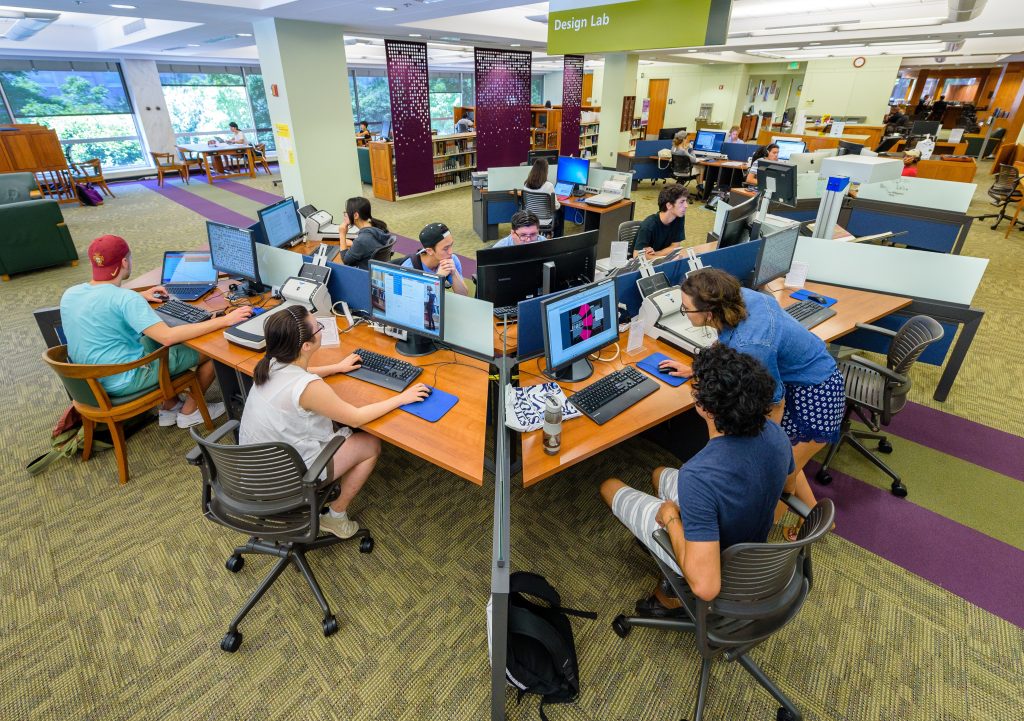
The Undergraduate Library’s Design Lab is the place to learn and practice digital design skills. Photograph by Mark Perry / University Libraries
“While the specific needs are different, we are always evolving to meet them,” says Suchi Mohanty, M.S.L.S. ’02, and head of the Undergraduate Library. “The biggest difference is the availability of technology, but we are more committed than ever to teaching, learning and helping undergraduates become successful researchers. We want them to acclimate and gain confidence in using all the information resources at the University Libraries, as well as to feel comfortable on campus.”
Kelsey Hammer, B.A. ’15, M.S.L.S. ’18, worked as a research assistant at the UL while earning her master’s degree. “While I was an undergraduate, the UL was like a second home for me,” says Hammer, now digital literacy librarian at Virginia Tech. “It’s a place of comfort and community.”
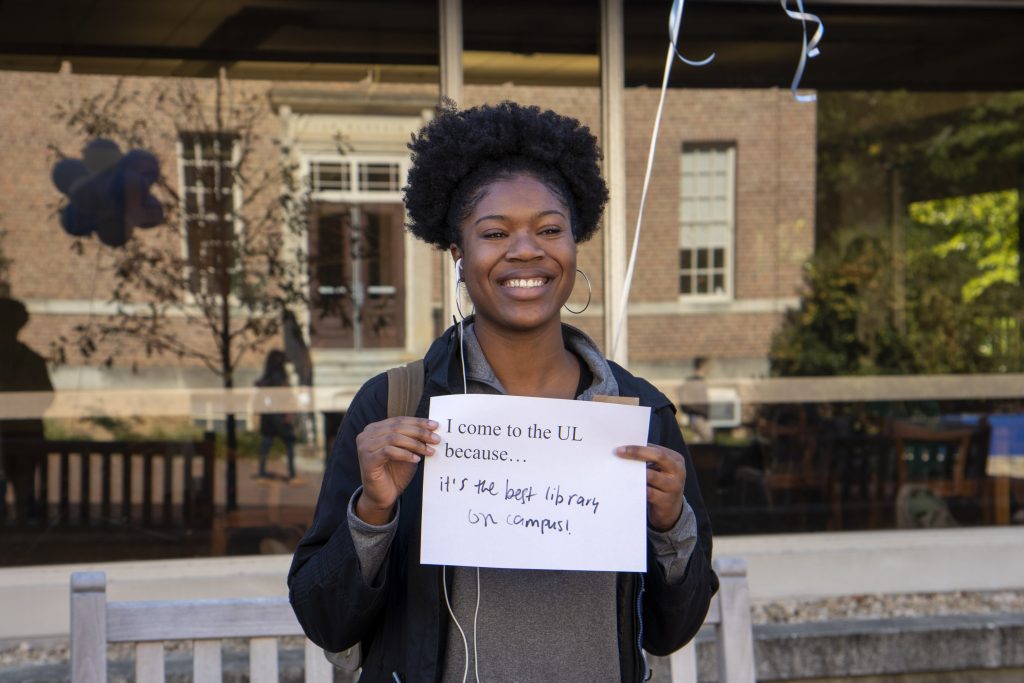
Photograph by Aleah Howell / University Libraries
That positive feeling dates to the library’s launch, according to Jean Neville, B.A. ’69, M.A. ’72, and a member of the Friends of the Library Board. “The library was open and well-lighted and the desks and study areas were comfortable,” says Neville, who was a senior when the UL opened. In other libraries, she recalls, “you had to be very respectful of the quiet atmosphere. The new library was more inviting and made studying fun as well as productive.”
UL librarians have worked hard to maintain that approach and Hammer sees the UL’s care for students as a key to its enduring success. “The librarians and staff members, along with student employees, are exceptional, kind and very good at their jobs,” says Hammer. “They always say, ‘What do our students need?’ Nothing is completed or created without asking what the students want or need.”
A Competitive Advantage
An unrelenting focus on the needs of undergraduates makes the UL a campus and national model for serving students, according to Elaine Westbrooks, vice provost for University Libraries and University librarian. “For the most part, research libraries have focused on faculty,” she says. “UNC-Chapel Hill made a decision 50 years ago to design a library facility for our undergraduates. For today’s UL staff, it’s still about students first.”
“We’re going to continue to evolve with our students and address what it means to be a student in the digital age,” says Westbrooks. “Undergraduates today consume the bulk of their information through a cell phone. The UL understands that and knows how to give these students a competitive advantage in finding, evaluating and using information that will help them learn and be successful. We’re preparing students for jobs that don’t even exist yet.”
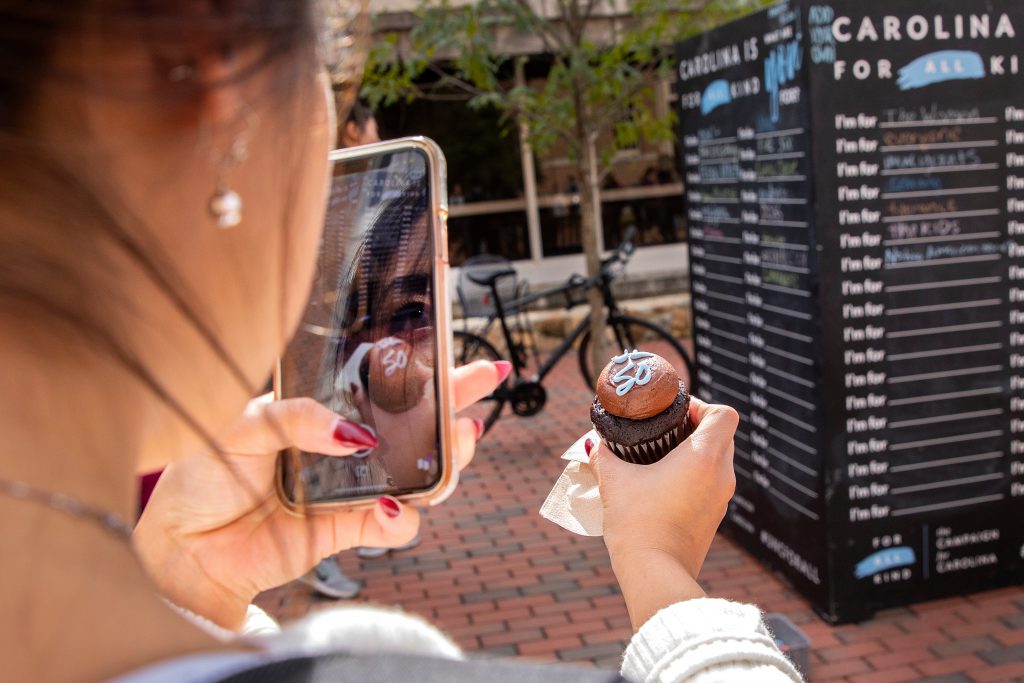
Photograph by Johnny Andrews / UNC-Chapel Hill
One way that UL staff help undergraduates build foundational skills is by working closely with instructors. “We offer a range of instructional support from helping students develop core research skills to creating complex media projects,” says Mohanty. “We partner closely with faculty as they develop and teach their courses.”
Rachel Schaevitz, postdoctoral fellow with Carolina Public Humanities, is one faculty member who has collaborated with UL staff to create undergraduate learning experiences that integrate the library’s technological resources. Schaevitz’s classes have created instructional videos for K-12 teaching and promotional videos for local nonprofits, learning from UL staff how to shoot, edit and produce a visual story.
“Education is evolving in a way that needs to match the evolution of technology,” says Schaevitz. “As important as it is for students to read a novel or write a paper, it is as critical that our students can swim in the digital and visual waters we have today. Not providing them an opportunity to learn that would be a disservice.”
The recognition that students need these skills for educational and workplace success has led to fundamental changes in the UL’s footprint and offerings. The book collection is much smaller than fifty years ago, says Mohanty, because so much of what students need is online.
Instead, new spaces and personnel help students master technologies and thrive in a digital world. The UL’s Media Resources Center opened in 2002 with a research-level media collection and a focus on audiovisual learning. Here students can borrow video cameras and microphones, edit video, make recordings in the audio studio or conduct an interview in the brand-new podcast studio. The Design Lab is similarly devoted to the teaching and learning of digital design.
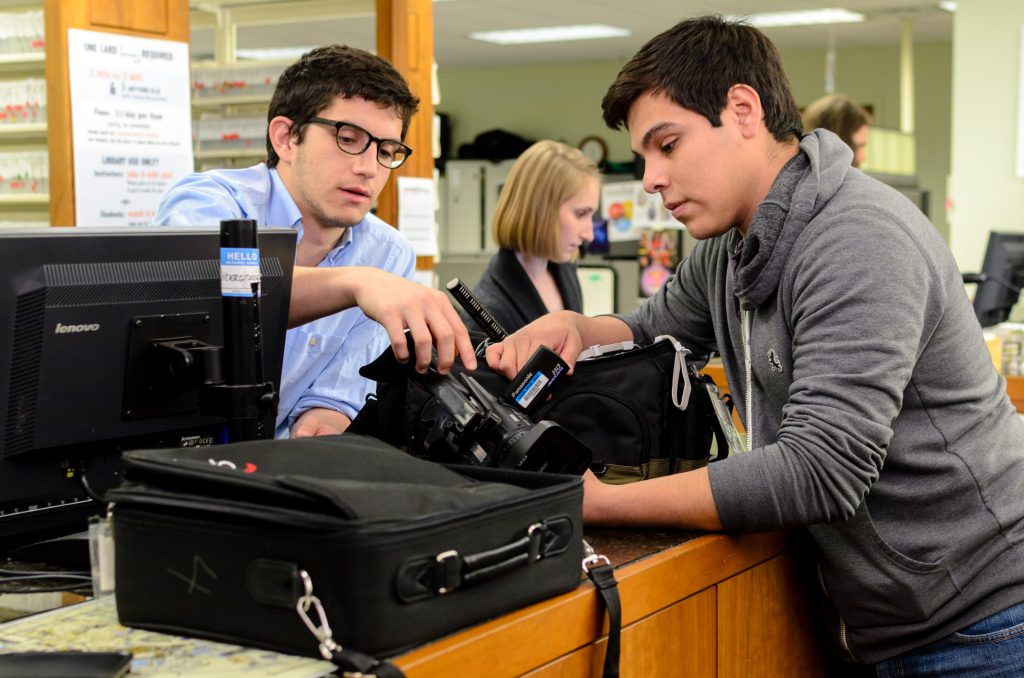
Students can borrow video production equipment and learn how to use it in the Media Resources Center at the Undergraduate Library. Photograph by Mark Perry / University Libraries
“We have continued to expand these spaces because of the demand,” says Mohanty. Where a written term paper once was the standard, she says, “students are being asked to communicate their research in effective, technology-forward ways.” To help them, the UL provides not only the equipment, but also the teaching and guidance to help students create infographics, podcasts, short videos and academic posters.
Caring for the Whole Student
Another hallmark of the UL’s approach is a focus on the whole student, with personal growth, well-being and stress management at the core.
“Student life is different now,” says Mohanty. “We see a growing number of transfer students, first-generation students, international students and students from rural areas who don’t always come in with a shared baseline of knowledge. We have an obligation to help every student be as successful as possible.”
Programming outside the curriculum is one way the UL helps students make the most of college and prepare for life after graduation. For example, every year several hundred students stand in line to play miniature golf in the UL during Week of Welcome. The game serves as a fun library orientation and sparks friendships at a moment when many students feel alone.
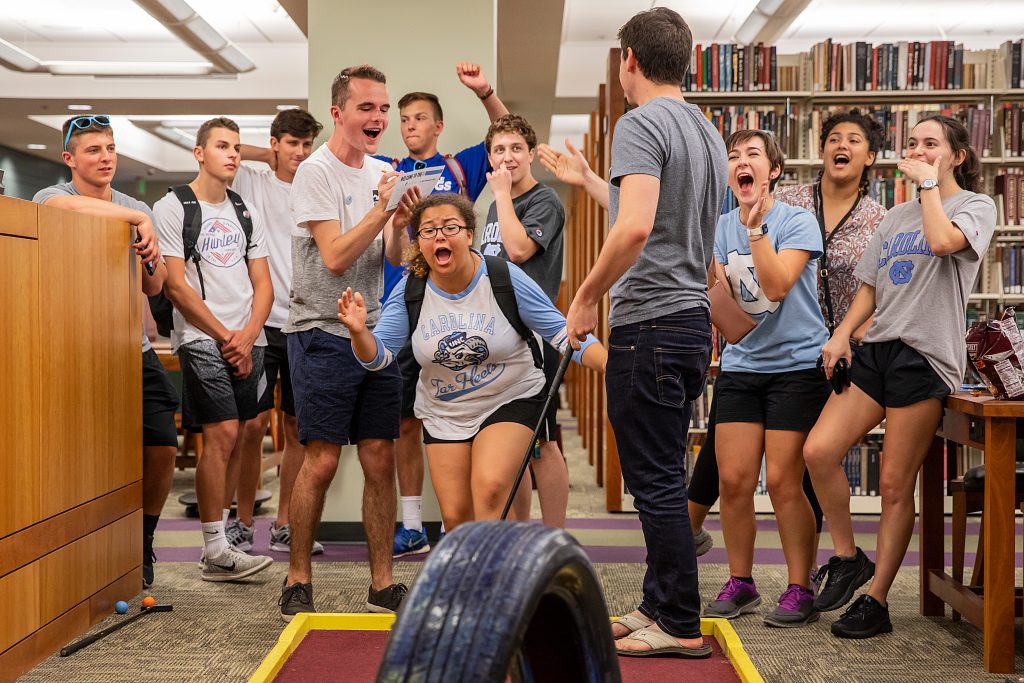
Miniature golf at the Undergraduate Library is a Carolina Week of Welcome tradition. Photograph by Johnny Andrews / UNC-Chapel Hill
Non-credit workshops teach skills without tests or pressure. The SkillfUL Tech Workshops series focuses on technology with practical deliverables, such as creating GIFs or designing a visually effective résumé or online portfolio. Adulting 101, currently being piloted, offers sessions on topics such as budgeting, finding reliable health information on the web and researching political candidates and issues.
Mohanty says the small size and student focus of the UL allow for innovation and creativity. “We can try a new initiative or service and iterate it very quickly. This is a vibrant and creative research and learning space,” says Mohanty. “While we also do fun things, there is serious learning happening here.”
Westbrooks agrees. “Our job is to set up a library, have great collections, and hire great people,” she says. “The goal is to prepare students to go out and change the world. The UL does that every day.”
Story by Michele Lynn and Judy Panitch


